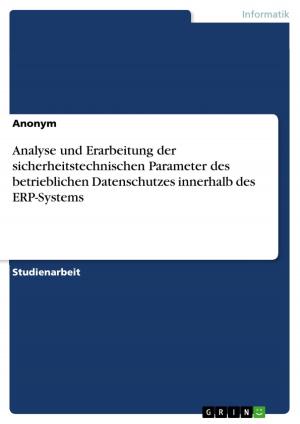| Author: | Sanjay Tupe | ISBN: | 9783656884798 |
| Publisher: | GRIN Verlag | Publication: | January 27, 2015 |
| Imprint: | GRIN Verlag | Language: | English |
| Author: | Sanjay Tupe |
| ISBN: | 9783656884798 |
| Publisher: | GRIN Verlag |
| Publication: | January 27, 2015 |
| Imprint: | GRIN Verlag |
| Language: | English |
Document from the year 2012 in the subject Economics - Finance, Savitribai Phule Pune University, formerly University of Pune (Board for University and College Development, University of Pune - B. Y. K. College of Commerce Nashik-5), course: Minor Research Report - Post Graduate, Phd, M. Phil., language: English, abstract: Indian software industry is of recent origin. It has been growing since signing of international treaty in1994 by Indian government. Since then, India has been emerging as one of the major giant in the field of Information Technology Enabled Services (ITES) and Business Process Outsourcing (BPO). According to National Association of Software and Services Companies (NASSCOM), IT Business Process Outsourcing (BPO) sector has been contributing 7.5 per cent of India's GDP, 25 per cent of India's total export and 10 per cent of total service sector revenue in 2010-11. IT services is the fastest growing segment among the others, it has been growing by 22.7 per cent, and generating export revenue (including hardware) of $69 billion. The share of software service exports from India was recorded around 58 per cent of the total global software service exports in 2011-12. This study is conducted to explore the contribution of Indian software firms in the development of Indian economy since its inception along with it emergence as one of the new industry on the map of Indian corporate and the world. We identify the challenges faced by these industries in general and issues in financing of these firms particular. For this task, we organize the present study into eight chapters. This study explores the drivers of Indian software industry growth, for that we run linear regression. We empirically test the impact of new economic reforms on the Indian software industry. Using the various econometric techniques, before and after the introduction of economic reforms period growth rate is compared to know whether there is any change in the growth story of the Indian software firms during the reforms period. Present study reviews the employment growth in Indian IT-BPO firms and also tests empirical relationship between export revenue of IT-BPO firms and employment growth in software industry. Main focus of the study is to find out the issues in financing of the new economy firms in India. In the broad perspective, this study is pursued for finding out which sources of finance are being tapped by these firms for financing themselves. In order to test hypotheses relating to drivers of software industry growth in India, regression I and II have been run and results appeared thereof shows that the coefficient values of the variables, money supply (M3GDP), domestic capital formation ( DCGDP), opening of economy (OPGDP) and stock foreign exchange (FRGDP) are significant at 10%,
- Name Dr. Sanjay N. Tupe 2. Educational Qualifications M.A (Econ), LLB, M. Phil, PhD (Economics and Finance) IIT, Mumbai, India in 2009 Post Doctorate Fellow in Economics of OUCIP, Osmania University, Hyderabad (Funded by American Consulate Hyderabad. 3. International Research Experience Working as reviewer for the International Journal of Trade, Economics and Finance (ISSN: 2010-023X) publishes from Singapore. 4. Countries Visited Germany, Austria, Holland for research paper presentation in international conferences. 5. Academic, Research & Administrative Experience Presently working as Associate professor (due for professor) & Head, Department of Banking and Finance at B.Y.K. College of commerce, Nashik-5. 6. Publications/ Presentations in National and International Journals and Conferences 50 presentations given including invited talks and worked as session in charge in the field of Finance, Economics, Agricultural economics, energy economics, economic reforms and its impact, productivity improvement, Educational quality enhancement, environmental protection, etc. 15 Policy oriented research papers published in Peer review journals and Magazines, 25 articles published in Newspapers. 7. Research Guidance Post graduate recognized teacher and PhD Supervisor in the subjects: Economics, Banking, Finance and Management. 8. Area of Research interest -Infrastructure Financing, Issues in Economic Reforms and Sectoral Reforms, Energy security, International Trade, Issues in Banking and Financial Institutions 10. Academic and Professional Expertise offered/ Life member of academic bodies Worked as reviewers for various journals and examiner for selecting award 1.The All India Marathi Arhtshastra Parishad Mumbai 2.Indian Economic Association 3.The Indian Econometric Society 4.Think line 11. Awards and Recognition 1.Teacher Fellowship Awarded for the Period (2003-2005) by U.G.C for pursuing Ph. D. 2.Secured First Rank in Post Graduate Diploma in Capital Market Management in Pune University. 3.Award Rs. 4000/- for best research paper published in refereed journal awarded by Marathi Arhtshastra Parishad, Pune in 2011.
Document from the year 2012 in the subject Economics - Finance, Savitribai Phule Pune University, formerly University of Pune (Board for University and College Development, University of Pune - B. Y. K. College of Commerce Nashik-5), course: Minor Research Report - Post Graduate, Phd, M. Phil., language: English, abstract: Indian software industry is of recent origin. It has been growing since signing of international treaty in1994 by Indian government. Since then, India has been emerging as one of the major giant in the field of Information Technology Enabled Services (ITES) and Business Process Outsourcing (BPO). According to National Association of Software and Services Companies (NASSCOM), IT Business Process Outsourcing (BPO) sector has been contributing 7.5 per cent of India's GDP, 25 per cent of India's total export and 10 per cent of total service sector revenue in 2010-11. IT services is the fastest growing segment among the others, it has been growing by 22.7 per cent, and generating export revenue (including hardware) of $69 billion. The share of software service exports from India was recorded around 58 per cent of the total global software service exports in 2011-12. This study is conducted to explore the contribution of Indian software firms in the development of Indian economy since its inception along with it emergence as one of the new industry on the map of Indian corporate and the world. We identify the challenges faced by these industries in general and issues in financing of these firms particular. For this task, we organize the present study into eight chapters. This study explores the drivers of Indian software industry growth, for that we run linear regression. We empirically test the impact of new economic reforms on the Indian software industry. Using the various econometric techniques, before and after the introduction of economic reforms period growth rate is compared to know whether there is any change in the growth story of the Indian software firms during the reforms period. Present study reviews the employment growth in Indian IT-BPO firms and also tests empirical relationship between export revenue of IT-BPO firms and employment growth in software industry. Main focus of the study is to find out the issues in financing of the new economy firms in India. In the broad perspective, this study is pursued for finding out which sources of finance are being tapped by these firms for financing themselves. In order to test hypotheses relating to drivers of software industry growth in India, regression I and II have been run and results appeared thereof shows that the coefficient values of the variables, money supply (M3GDP), domestic capital formation ( DCGDP), opening of economy (OPGDP) and stock foreign exchange (FRGDP) are significant at 10%,
- Name Dr. Sanjay N. Tupe 2. Educational Qualifications M.A (Econ), LLB, M. Phil, PhD (Economics and Finance) IIT, Mumbai, India in 2009 Post Doctorate Fellow in Economics of OUCIP, Osmania University, Hyderabad (Funded by American Consulate Hyderabad. 3. International Research Experience Working as reviewer for the International Journal of Trade, Economics and Finance (ISSN: 2010-023X) publishes from Singapore. 4. Countries Visited Germany, Austria, Holland for research paper presentation in international conferences. 5. Academic, Research & Administrative Experience Presently working as Associate professor (due for professor) & Head, Department of Banking and Finance at B.Y.K. College of commerce, Nashik-5. 6. Publications/ Presentations in National and International Journals and Conferences 50 presentations given including invited talks and worked as session in charge in the field of Finance, Economics, Agricultural economics, energy economics, economic reforms and its impact, productivity improvement, Educational quality enhancement, environmental protection, etc. 15 Policy oriented research papers published in Peer review journals and Magazines, 25 articles published in Newspapers. 7. Research Guidance Post graduate recognized teacher and PhD Supervisor in the subjects: Economics, Banking, Finance and Management. 8. Area of Research interest -Infrastructure Financing, Issues in Economic Reforms and Sectoral Reforms, Energy security, International Trade, Issues in Banking and Financial Institutions 10. Academic and Professional Expertise offered/ Life member of academic bodies Worked as reviewers for various journals and examiner for selecting award 1.The All India Marathi Arhtshastra Parishad Mumbai 2.Indian Economic Association 3.The Indian Econometric Society 4.Think line 11. Awards and Recognition 1.Teacher Fellowship Awarded for the Period (2003-2005) by U.G.C for pursuing Ph. D. 2.Secured First Rank in Post Graduate Diploma in Capital Market Management in Pune University. 3.Award Rs. 4000/- for best research paper published in refereed journal awarded by Marathi Arhtshastra Parishad, Pune in 2011.















